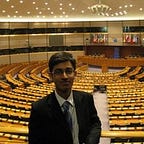280 million, not just any number. Kinchit Bihani
Title: What matters? Individual or collective will — Climate Change
It was 2019. Editor of BBC Radio 4 Today programme, Sarah Sands tasked BBC presenter, Mishal Husain, to conduct an interview. Mishal, 46 then, had to interview a teenager, thirty years younger than her. The decision was made last minute. A challenge arose: the fact that the guest was based outside the UK was not a challenge, nor that there were no flight tickets left to make a round trip.
The challenge was ethical: emitting half a ton of carbon dioxide to interview Greta Thunberg who epitomises zero carbon human.
The question I am asking here is simple: like Mishal, should we make more conscious decisions regarding our carbon footprint in carrying out our daily life activities? Switching off lights in your rooms before leaving, not running heating/cooling devices at temperature that bring back feel of winters in summers and vice-versa, picking a four hour train journey over a flight to a destination, pooling cars, using more public transport, buying less plastics so on and so forth.
You might think, we know that. What’s new in it? But what good can our actions be? Very inconsequential or merely eye-washing. Others continue to destroy the Earth. As I see it, the answer is change in conscience. Transitioning from an individual to a collective will, will of the humankind as a whole, an epicentre of change. The challenge is to reach a critical mass. The guiding force and inspiration for us is Erica Chenoweth, a political scientist at Harvard, whose research tells, “ Nonviolent protests are twice as likely to succeed as armed conflicts — and those engaging a threshold of 3.5% of the population have never failed to bring about change.”
For Earth’s human population (8 billion), this means 280 million people, roughly the population of Indonesia or 2.7 times the population of Egypt (host of COP27 meeting).
Mahatma Gandhi said, “We but mirror the world… If we could change ourselves, the tendencies in the world would also change. As a man changes his own nature, so does the attitude of the world change towards him…”
It is for each one of us to judge whether we belong to those 280 million or not. Neither is this message prescriptive, nor anyone should claim to hold any moral high ground above others. Importantly, there is no right and wrong. A free will always prevails, but what if the will can be sustainable too. Yes, the hundreds of governments around the world will legislate, millions of businesses will innovate, but what if billions of humans co-operate. Our positive actions can be contagious.
P.S. Hashtag (#SaveThePlanet) won’t alone Save The Planet.
My book (below) generally appeals to Earthlings who worry about the state of the world we live in and want to make a difference.
